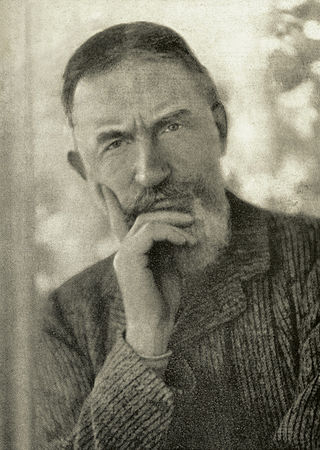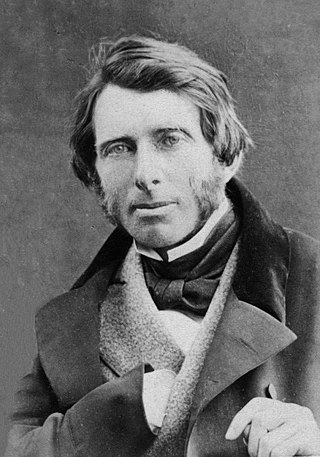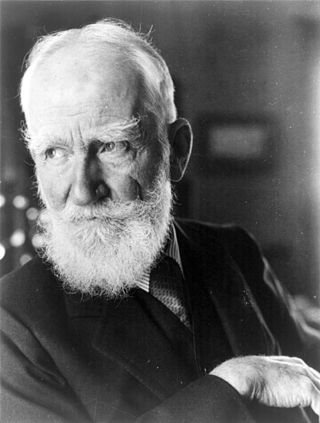
George Bernard Shaw, known at his insistence as Bernard Shaw, was an Irish playwright, critic, polemicist and political activist. His influence on Western theatre, culture and politics extended from the 1880s to his death and beyond. He wrote more than sixty plays, including major works such as Man and Superman (1902), Pygmalion (1913) and Saint Joan (1923). With a range incorporating both contemporary satire and historical allegory, Shaw became the leading dramatist of his generation, and in 1925 was awarded the Nobel Prize in Literature.

Anti-capitalism is a political ideology and movement encompassing a variety of attitudes and ideas that oppose capitalism. In this sense, anti-capitalists are those who wish to replace capitalism with another type of economic system, such as socialism or communism.

John Ruskin was an English writer, philosopher, art critic and polymath of the Victorian era. He wrote on subjects as varied as geology, architecture, myth, ornithology, literature, education, botany and political economy.

Arnold Toynbee was an English economic historian also noted for his social commitment and desire to improve the living conditions of the working classes.
Christian socialism is a religious and political philosophy that blends Christianity and socialism, endorsing left-wing politics and socialist economics on the basis of the Bible and the teachings of Jesus. Many Christian socialists believe capitalism to be idolatrous and rooted in the sin of greed. Christian socialists identify the cause of social inequality to be the greed that they associate with capitalism. Christian socialism became a major movement in the United Kingdom beginning in the 19th century. The Christian Socialist Movement, known as Christians on the Left since 2013, is one formal group, as well as a faction of the Labour Party.

Equality of outcome, equality of condition, or equality of results is a political concept which is central to some political ideologies and is used in some political discourse, often in contrast to the term equality of opportunity. It describes a state in which all people have approximately the same material wealth and income, or in which the general economic conditions of everyone's lives are alike.
Catallactics is a theory of the way the free market system reaches exchange ratios and prices. It aims to analyse all actions based on monetary calculation and trace the formation of prices back to the point where an agent makes his or her choices. It explains prices as they are, rather than as they "should" be. The laws of catallactics are not value judgments, but aim to be exact, empirical, and of universal validity. It was used extensively by the Austrian School economist Ludwig von Mises.

African socialism or Afrosocialism is a belief in sharing economic resources in a traditional African way, as distinct from classical socialism. Many African politicians of the 1950s and 1960s professed their support for African socialism, although definitions and interpretations of this term varied considerably. These politicians include Julius Nyerere of Tanzania, Kwame Nkrumah of Ghana, and Modibo Keita of Mali, among others.
The dismal science is a derogatory term for the discipline of economics. Scottish essayist, historian and philosopher Thomas Carlyle used the phrase in his 1849 essay, Occasional Discourse on the Negro Question, in contrast with the then-familiar phrase "gay science" used to refer to the art of troubadours.
Unto This Last is an essay critical of economics by John Ruskin, who published the first chapter between August and December 1860 in the monthly journal Cornhill Magazine in four articles.
Sarvōdaya is a Sanskrit term which generally means "universal uplift" or "progress of all". The term was used by Mahatma Gandhi as the title of his 1908 translation of John Ruskin's critique of political economy, Unto This Last, and Gandhi came to use the term for the ideal of his own political philosophy. Later Gandhians, like the Indian nonviolence activist Vinoba Bhave, embraced the term as a name for the social movement in post-independence India which strove to ensure that self-determination and equality reached all strata of Indian society. Samantabhadra, an illustrious Digambara monk, as early as the 2nd century A.D., called the tīrtha of Mahāvīra by the name sarvodaya.

A steady-state economy is an economy made up of a constant stock of physical wealth (capital) and a constant population size. In effect, such an economy does not grow in the course of time. The term usually refers to the national economy of a particular country, but it is also applicable to the economic system of a city, a region, or the entire world. Early in the history of economic thought, classical economist Adam Smith of the 18th century developed the concept of a stationary state of an economy: Smith believed that any national economy in the world would sooner or later settle in a final state of stationarity.
Economic progressivism or fiscalprogressivism is a political and economic philosophy incorporating the socioeconomic principles of social democrats and political progressives. These views are often rooted in the concept of social justice and have the goal of improving the human condition through government regulation, social protections and the maintenance of public goods. It is not to be confused with the more general idea of progress in relation to economic growth.

Charlotte Mary Wilson was an English Fabian and anarchist who co-founded Freedom newspaper in 1886 with Peter Kropotkin, and edited, published, and largely financed it during its first decade. She remained editor of Freedom until 1895.

A mistress is a woman who is in a relatively long-term sexual and romantic relationship with someone who is married to a different person.

In economics, scarcity "refers to the basic fact of life that there exists only a finite amount of human and nonhuman resources which the best technical knowledge is capable of using to produce only limited maximum amounts of each economic good." If the conditions of scarcity didn't exist and an "infinite amount of every good could be produced or human wants fully satisfied ... there would be no economic goods, i.e. goods that are relatively scarce..." Scarcity is the limited availability of a commodity, which may be in demand in the market or by the commons. Scarcity also includes an individual's lack of resources to buy commodities. The opposite of scarcity is abundance. Scarcity plays a key role in economic theory, and it is essential for a "proper definition of economics itself".
"The best example is perhaps Walras' definition of social wealth, i.e., economic goods. 'By social wealth', says Walras, 'I mean all things, material or immaterial, that are scarce, that is to say, on the one hand, useful to us and, on the other hand, only available to us in limited quantity'."

The Fabian Society is a British socialist organisation whose purpose is to advance the principles of social democracy and democratic socialism via gradualist and reformist effort in democracies, rather than by revolutionary overthrow. The Fabian Society was also historically related to radicalism, a left-wing liberal tradition.
Clive Wilmer is a British poet, who has published nine volumes of poetry. He is also a critic, literary journalist, broadcaster and lecturer.
Critique of political economy or simply the first critique of economy is a form of social critique that rejects the conventional ways of distributing resources. The critique also rejects what its advocates believe are unrealistic axioms, faulty historical assumptions, and taking conventional economic mechanisms as a given or as transhistorical. The critique asserts the conventional economy is merely one of many types of historically specific ways to distribute resources, which emerged along with modernity.

The British Party System (1944) is a "playlet" by George Bernard Shaw satirically analysing the origins of the party system in British politics in the form of a pair of conversations between scheming power-brokers at various points in history, who devise it and adapt it to suit their personal ends.













